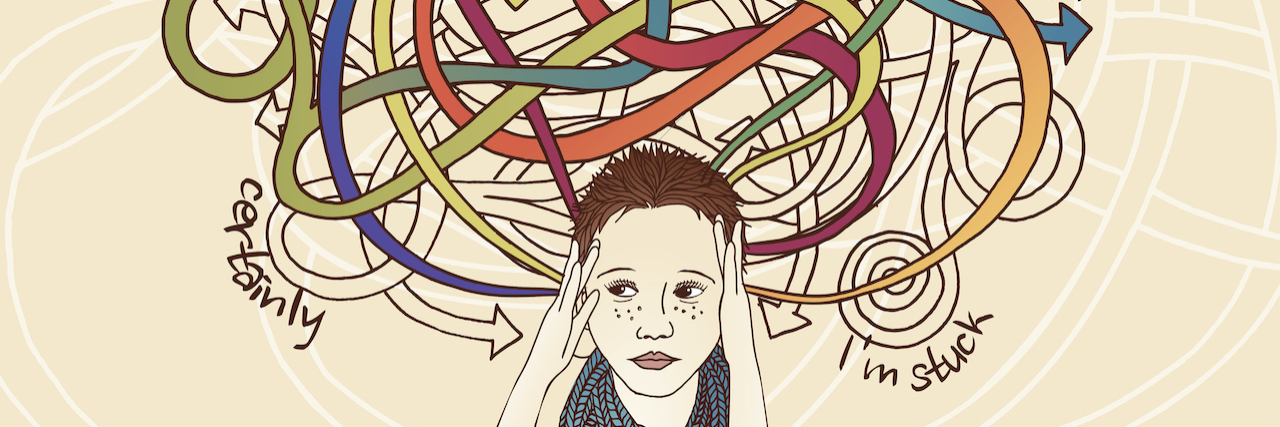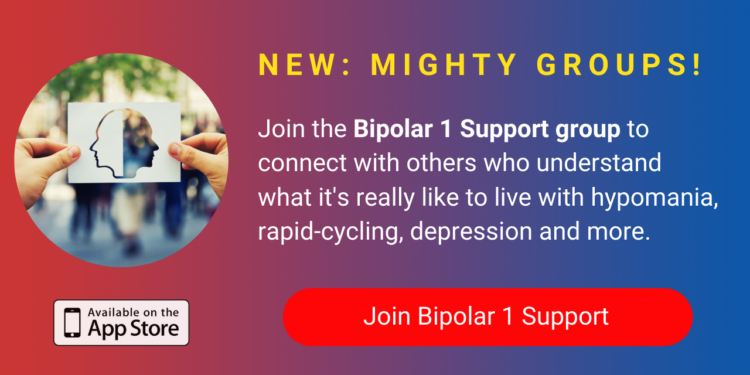In my opinion, the unpredictability of mental illness is one of the largest reasons why living with severe mental health issues is so debilitating. Although I personally am doing much better these days and have been doing relatively well overall, my diagnoses and symptoms are still not as controlled as I would like. There can also be times where all sorts of nasty issues just breakthrough the barriers of medication and therapy, oftentimes with little warning to no warning at all.
• What is Bipolar disorder?
It seems like a lot of people, even some struggling with mental illness, believe that psychiatric medications can just “fix” or “cure” everything. As if taking all these little pills just magically makes it all better. Even with therapy, some think therapists are miracle workers, and if someone attends a few sessions with their doctor, they’ll automatically come out as this wonderfully new and improved version of themselves.
While both medication and therapy can indeed help immensely, no, it’s not like taking sinus medication to clear out your clogged nostrils or taking a pain reliever to get rid of a headache. It doesn’t just take it all away and cause diagnoses or symptoms to cease to be. I will most likely live with my mental illnesses for the rest of my life and I may very well even be medicated until the day I die. I came into this world as an extremely troubled individual and I will most likely cross to the other side as one.
Taking an antidepressant is not like taking cold medicine, and even if someone is on it for years, they still have depression. Taking a mood stabilizer for something like bipolar disorder may be a lifelong commitment for some, yet that bipolar disorder will never go away.
For an example of my own mental health making things unpredictable, just this past January, I had a sudden bout of debilitating bipolar issues that rendered me non-functioning, completely out of the blue. It was a hypomanic episode which lasted a total of two weeks, meaning two weeks of my life were thoroughly and utterly wasted. I had also somewhat been cycling in December, meaning I was having minute episodes here and there, which I shrugged off because they honestly weren’t anything too out of the ordinary for me at that time. Then after those two weeks, I spent about five to seven days the next week picking up the pieces and trying to stabilize myself, so essentially all of January was ruined.
During this time, my moods became incredibly erratic and I was also quite belligerent and hostile (not on a violent level, more just argumentative, unpleasant and snippy). My speech patterns became illogical, irregular and sometimes slurred, and my thinking was schizophrenic (meaning disjointed, nonsensical and psychotic in this case). I was experiencing troubling delusions in my head, as well as seeing illusions. I also became ridiculously paranoid, so I did not leave the house at all for those two to three weeks, and I would constantly stare out the windows to make sure nothing suspicious was happening. I was continuously checking the locks throughout the house, even on windows. I was consistently going around the house ranting, raving and spouting off on tangents on just about anything that crossed my mind (the fridge not being organized, our Echo listening in on the house, etc.). Lastly, I became very resentful towards both my parents and was mouthing off to them and harshly criticizing almost everything they were doing at that time.
Yet even in December when I was having minor cycling and then in February once I had stabilized, none of that was going on. None of those thoughts were going through my head, my speech patterns were regular and I was more active and able to do things. I may have been my normal blunt and loud self, but I wasn’t vulgar and ranting. Both my illusions and delusions were under control and I was essentially my “normal” self (the term “normal” being used extremely loosely).
One huge, obvious and related stigma to point out would be the question “can’t it be turned off?” Is there maybe a button I hide at the back of my neck that I can press, can I pop a pill to instantly feel better, or is there some sort of mantra I can repeat to myself in order to just completely “stop everything?”
No! If it were that simple, then why on Earth would I force myself to keep living this way?
Do you know how many people I have had ask me questions about “turning it off” or “controlling it?” Do you know how many times I’ve received unnecessary, unwanted advice, things like “try to get more sun” or “try to think more positively?” Do you know how many times I’ve read that this is a thing people believe, that mental illness can be solved with something as simple as a single pill, a single therapy session, eating better or drinking more water? I can’t even tell you how many times!
If someone is not a doctor or any sort of mental health professional, then they have no business telling me or any other mentally ill individual how to solve their issues or live their life. If someone has a very little understanding or no understanding at all of mental health, then they have no say in what is best for me or anyone else dealing with mental health issues.
Two of the best ways to fight mental illness are with therapy and/or medication: two legitimate, proven methods. Telling someone with mental health issues to just “think positively” is not helpful. Thinking depression can be solved by “getting out more” is like thinking that cystic acne can be fixed by “just washing your face more.” Mental health simply does not work that way and is not anywhere near being that simple.
Going back to the unpredictable nature of mental health, that’s another reason why these at-home, layman remedies don’t work. If someone has such severe OCD (obsessive-compulsive disorder) that they’ve become a shut in, I can almost guarantee you they’re not going to “get out more.” If someone is going through a severe depressive episode, it can be extremely hard to get out of bed and really do anything at all. If someone has extreme social anxiety, it can be almost impossible to “think positively” and make confident, beneficial choices in their life. Some people with mental illness have no idea how their day is going to go until they wake up, which can make their lives overall unstable, precarious and confusing, for them and everyone else involved.
As for “turning it off,” no, that is not possible either. Symptoms and diagnoses can be covered up, pushed down, lessened or helped, but there is no turning any of it off. Individuals with mental illness can learn how to cope with their issues better and they can learn how to live their lives in a more successful and happy way, but there is still no turning anything off, especially with more severe mental illnesses and symptoms.
Another piece to this puzzle is since a large portion of our society relies on the news or talk shows for their information and also have a hard time understanding just what exactly is real and what’s exaggerated, that is where a lot of people’s understanding of mentally illness comes from. When they see something on the news about the latest school shooting or some sort of portrayal of mentally illness in movies and television shows, so many people just eat that up like the pure, honest facts they believe are being shown. That is where so many fall short.
The media for years now has been doing a huge disservice to the mental health community and to assume what is being shown is accurate is ludicrous. What movies, television shows and the news show as far as mental illness goes is exaggerated, sensationalist, inaccurate, hurtful and a lot of the time just plain wrong. It has been proven time and again that the portrayal of people with mentally illness in Hollywood and elsewhere only perpetuates the stereotypes and stigmas attached to mental illness. It pushes completely negative, incorrect displays of mentally illness into our society, thus building most people’s understandings of mental illness into something monstrous and abhorrent.
Recently with shows like “The Good Doctor” or even movies like “Joker,” topics such as autism and mental health are being shown to the general public in a much more accurate, proper and positive light, which I very much appreciate. However, there still needs to be many more of these types of shows or movies to truly make an impact.
Sometimes when someone is dissociating, psychotic, manic and so on, they are not in control of themselves or their actions. That can be scary, I admit, and for others near that person, it can be extremely disconcerting and nerve-wracking. However, first it’s a good idea to know that most people with mental illness are not more violent than anyone else. Secondly, another good way to try to help the other person is to try to have some empathy for them and think how terrible that must feel to be someone who has no control over themselves at times. To be someone with a brain that continuously causes them to struggle. To be someone who wakes up out of whatever stupor they were in to realize the trouble they’ve caused, then they have to live with that. I have at times when my mania has been at its worst legitimately felt like a demon has slithered its way inside of me, and I can’t even explain to you how that feels.
As for me and any other individual with mental illness, our diagnoses do not define who we are. How I act when I am manic is not me. How I act when I am depressed is not me. How I act when I am suicidal or obsessive is not me, it is a product of the issues I carry with me every single day.
That’s what others need to realize, what we need to look at with people with mental illness, people with autism and so on. We know we cause a lot of strife and heartache in our families and friends. We know we’re offbeat, that we don’t always make sense, and we might be hard to “get.” We know we’re hard to understand and may even be secretive or mysterious. But if you are someone who is able to pull those layers back, you will most likely find a huge heart and a wonderful, feeling, breathing person underneath. You should try it some time.
Getty image by frimages


